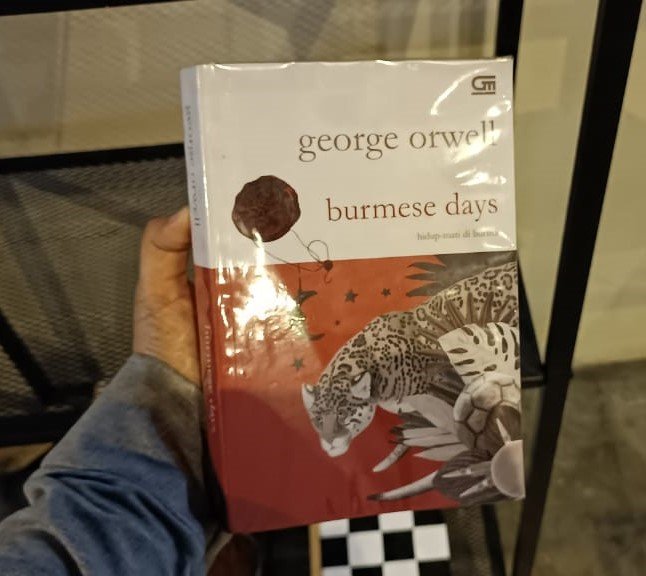George Orwell is a master of capturing the everyday experiences in his writing. He has a knack for finding the universal experience in a specific thing so that it becomes a reflection of all people around the world.
George Orwell is a genius at taking ordinary life stories and turning them into something that everyone could relate to.
One case in point is the novel Burmese Days, which tells the story of a British colonial officer in Burma who is struggling to find his place in the world. The novel has been translated into Bahasa and published by quite a few publishers.
One of these has been translated under the title Hidup-Mati di Burma (Life and Death in Burma) by Gramedia.
This could be categorized as a semi-autobiographical novel that tells the story of George Orwell, the pen name of Eric Arthur Blair, a British colonial officer in Burma (now Myanmar). This is a firsthand account of Orwell's own experiences as a police officer in Burma from 1922 to 1927. Orwell uses the fictional setting of Kyauktada, a small town in Upper Burma.
This novel is unique in its perspective in view of the fact that it places the colonizer's viewpoint at the forefront, which is distinct from the majority of other historical novels.
The novel Burmese Days comprising twenty-five chapters, begins with centers on a British colonial club in Burma. This club is mandated to include a representative from the indigenous population.
The term used to describe the indigenous population in the novel is "Orientals," a reflection of the language commonly employed during that era to refer to people of Asian descent. In Indonesia, the indigenous population would be referred to as "Pribumi."
Noteworthy, during the 1920s, the British government extended an appeal to clubs in their colonies, urging them to welcome local members. However, it's worth writing down that the European Club in Kyauktada, Burma, stood out as the sole exception, devoid of any Oriental members.
The novel is told from the perspective of John Flory, a member of the European Club in Burma. Orwell uses Flory's character to explore some big themes like imperialism, racism, and the clash of cultures.
But I won't spoil it too much away, let me just say that there are some interesting points Orwell makes in this novel.
One figure, U Pyo Kin, stands out. He's a bit of a duplicity, hypocrite, working as a district chief. He takes advantage of his position to line his own pockets and mistreat the Burmese folks.
U Pyo Kin is like a metaphor for the kind of corruption and unfairness, bribing, you often see in developing countries, and his character feels pretty relevant to what's happening today. That's what I meant by one of Orwell's high quality at the beginning.
Our emotions are stirred as we journey through the chapters of this novel. It evokes feelings of anger, sadness, and hope. Orwell uses strong ingenuous, casual language to describe the reality of imperialism and racism.
Women were often depicted as having a status on par with rodents or frogs. This is where Orwell's brilliance shines; he could employ coarse, vulgar language yet craft it into something strangely beautiful when read.

This is what left M. Febi Anggara intrigued after reading Orwell's works. In the course of the discussion in the 67th week of the Klub Buku Main-Main on Monday, September 18, 2023, he raised the question: "Why did Orwell write in such a manner?"
"I don't have a definitive answer to that, but I have a hypothesis," replied Yosi Sulastri, the catalyst of this chat. "I hypothesize Orwell aimed to depict the situation in Burma in a straightforward and genuinely authentic manner, drawing from his own experiences during his five years as a police officer there."
Orwell's essay Why I Write may provide some insights, and clues, into his motivation for writing in such a manner.
On behalf of Orwell, politics and his literary work were inseparable, and even choosing not to be political is itself a political choice.
"According to Orwell, literature is politics; perhaps to us, the words he used may seem harsh or vulgar, but it's all politics — a means to convey his discontent with oppression," mentioned Firdaus, another participant in the talk.
Because of that, Orwell wrote Burmese Days in such a manner due he wanted to visually and authentically portray the conditions in Burma based on his personal experiences.

He is well aimed to use his writing as a tool to influence the world and make it a better place, advocating for love, and the eradication of racism, and anti-imperialism.
So, what is the difference between imperialism and colonialism?
"You can dominate a country without colonizing," replied a member of this discourse, Ndeye Kor.
Colonialism includes taking over foreign territories through military or political control, often including the settlement of colonists. Imperialism, in contrast, is the exertion of influence over other nations without physical colonization, often through economic and political means.
Kor's statement, "You can dominate a country without colonizing it," finds numerous real-life examples. One doesn't need to look far; in everyday life, we often encounter middlemen or brokers who provide loans to farmers or artisans, but in return, they demand that the harvest or products be sold to them at prices set by the middlemen, brokers.
This serves as a small-scale example of imperialism, a concept not overlooked by Orwell. Therefore, it's entirely reasonable that Burmese Days remains relevant and worth reading to this day.

At a stopping point, George Orwell's writings, particularly Burmese Days, stand as a powerful testament to his ability to capture the everyday experiences of life and transform them into profound reflections on universal themes. Orwell's keen observation of imperialism, racism, and the human condition is colorfully depicted through his use of strong and evocative language.
In the end is a challenging novel, but it is also a rewarding one. It is a novel that would make you think, feel and care. Reminding us of the enduring power of literature to shed light on the world's complexities and inspire positive change [mhg].